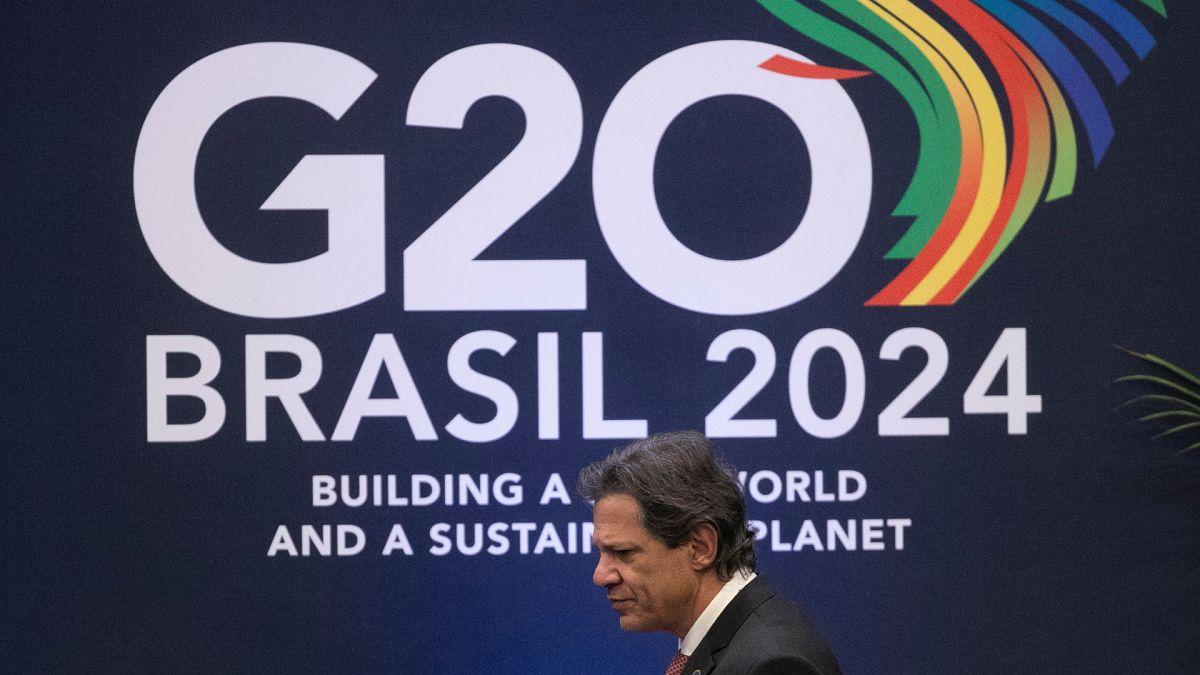Brazil’s Finance Minister, Fernando Haddad, presented a package of measures to contain fiscal spending that – he said – will generate savings of 70 billion reais (11.8 billion dollars) in the next two years.
The package includes measures such as a tax on the super-rich, exempting from income tax those who earn up to 5,000 reais per month, setting a minimum age for soldiers to join the reserve, limiting military pension transfers, correction of the inflation subsidy in the coming years until the benefit reaches the limit of one and a half minimum wages and increasing the global amount of parliamentary amendments below the limit of the fiscal rules, among other actions.
The launch of “the largest income tax reform in our history” sparked fears over the country’s budget deficit, which was reflected in the Brazilian real falling against the dollar to its all-time low. The real fell more than 0.9% to reach 5.99 reais per dollar during the morning, before recovering some ground, after Haddad himself came forward trying to calm tensions.
As explained by the minister, this measure will have a fiscal impact of 35,000 million reais (5,890 million dollars), which will be compensated by an increase in taxes on the highest-income sectors, under the premise that “whoever earns more must contribute more.” ”. These proposals will be debated in Congress and would come into effect in 2026.
Those earning more than 600,000 reais a year would see their effective income tax rate increase, reaching 10% for people earning more than 1 million reais annually, according to the proposal. To cover the rest of the fiscal blow, the Executive will end the income tax exemption for retirees with serious illnesses or who have suffered accidents and earn more than 20,000 reais per month, among other measures.
## Brazil unveils Bold Fiscal Reform: Can it Restore Confidence and curb Budget Deficit?
Brazil’s Finance Minister,Fernando Haddad,has unveiled an ambitious package of fiscal measures aimed at containing spending and stabilizing the country’s economy. the plan, which includes a controversial tax hike on high earners and exemptions for low-income earners, has sparked both optimism and anxiety, with the Brazilian real facing a critically important drop against the US dollar. To gain a deeper understanding of these complex developments and their potential impact, we sat down with two prominent economists: **Dr. Maria Silva**,Chief Economist at Banco do Brasil,and **Professor Carlos Garcia**,a leading expert on Brazilian economic policy at the University of São Paulo.
**Unpacking the Fiscal Reform and its Potential Impact**
**Introducing the Reform Package:**
**Fernando Haddad**’s proposed measures target a wide range of areas, from income tax restructuring to military pension reform. The centerpiece is a new income tax system, presenting both benefits and challenges for Brazil’s fiscal landscape.
**[Dr. Maria Silva]:** The government is walking a tightrope. These measures aim to generate significant savings – an impressive 70 billion reais over the next two years – a crucial step towards tackling the budget deficit and restoring investor confidence.
**[Professor Carlos Garcia]:** but the devil is in the details.While the exemption for low-income earners is commendable, the impact of the “super-rich” tax remains to be seen. it’s crucial to strike a balance between raising revenue and stifling economic growth.
**Impacts on Different Income Brackets:**
The reform introduces significant changes to income tax regulations, impacting various income brackets.
**[Dr. Maria Silva]:** Lower and middle-income earners stand to benefit from the increased exemption threshold of 5,000 reais per month. This will put more money in their pockets and perhaps stimulate consumer spending.
**[Professor Carlos Garcia]:** Conversely, those earning over 600,000 reais annually face a hefty increase in their effective income tax rate. The government argues this is a matter of fairness, suggesting that “whoever earns more must contribute more.” However, the economic consequences of this move, particularly on high-net-worth individuals and investment decisions, need careful consideration.
**AddressingInvestor Concerns:**
The Brazilian real’s sharp decline against the US dollar reflects nervousness among investors following the announcement of the fiscal measures.
**[Dr. Maria Silva]:** This drop is not entirely unexpected. Uncertainty breeds volatility. Investors need a clear understanding of the long-term implications of these reforms and reassurance about Brazil’s commitment to fiscal sustainability.
**[Professor Carlos Garcia]:** The government needs to be proactive in communicating the rationale behind these measures and demonstrating their ability to effectively implement them. Openness and clear communication are vital for restoring market confidence.
**Looking Ahead: Challenges and opportunities**
**moving Forward with Legislation:**
**[Dr. maria Silva]:** The success of these ambitious measures hinges on their approval by Congress. Securing bipartisan support will be a major challenge.
**[Professor Carlos Garcia]:** The government needs to build consensus and demonstrate the long-term benefits of these reforms for the Brazilian economy. This will require careful negotiation and compromise.
**Key Takeaways and Call to Action:**
Brazil’s bold fiscal reform presents both a daring escape route from a looming budget crisis and a potential catalyst for economic growth. The coming months will be critical as the government navigates the legislative process and seeks to reassure investors.
**What are your thoughts on the proposed reforms?** Share your insights and join the conversation in the comments section below.
**For further exploration:**
* “Brazil’s Fiscal Reform: A Path to Stability or a Recipe for Unrest?” – A deeper dive into the political and social implications of the reform.
* “The Impact of income Tax Reform on Brazil’s Wealth Distribution”– An analysis of the likely effects on different income groups.


